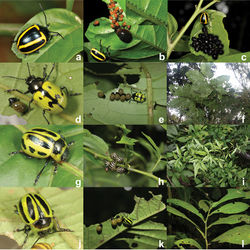Difference between revisions of "Proseicela spectabilis"
m (Imported from ZooKeys) |
m (1 revision) |
(No difference)
| |
Latest revision as of 14:35, 19 September 2013
| Notice: | This page is derived from the original publication listed below, whose author(s) should always be credited. Further contributors may edit and improve the content of this page and, consequently, need to be credited as well (see page history). Any assessment of factual correctness requires a careful review of the original article as well as of subsequent contributions.
If you are uncertain whether your planned contribution is correct or not, we suggest that you use the associated discussion page instead of editing the page directly. This page should be cited as follows (rationale):
Citation formats to copy and paste
BibTeX: @article{Windsor2013ZooKeys332, RIS/ Endnote: TY - JOUR Wikipedia/ Citizendium: <ref name="Windsor2013ZooKeys332">{{Citation See also the citation download page at the journal. |
Ordo: Coleoptera
Familia: Chrysomelidae
Genus: Proseicela
Name
Proseicela spectabilis (Baly, 1858) – Wikispecies link – Pensoft Profile
Remarks
Observations of Proseicela spectabilis were taken by G.D. while walking the main trail leading to the Cascadas de San Rafael, Reventador, Napo province, Ecuador (1300 m elevation; 0°6.07'S, 77°35.18'W) on July 17, 2011. A single female (Fig. 3g), was perched half above its larvae and half on the branch of its food plant. Six of the seven larvae in the formation were tightly aggregated around the thin stem of the plant, while the seventh larva was on a leaf a few centimeters away. A tachinid fly was present on the dorsal surface of a larva located on the side opposite the mother (Fig. 3h). The fly departed when the observer approached but promptly returned to land on the larva opposite the mother. The host plant (Fig. 3i) was later identified as a nightshade, Solanum sp. section Dulcamara.
Taxon Treatment
- Windsor, D; Dury, G; Frieiro-Costa, F; Susanne Lanckowsky, ; Pasteels, J; 2013: Subsocial Neotropical Doryphorini (Chrysomelidae, Chrysomelinae): new observations on behavior, host plants and systematics1 ZooKeys, 332: 71-93. doi
Images
|
